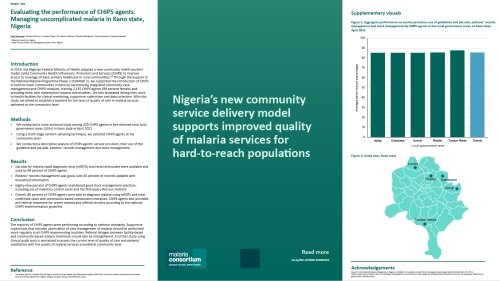
Publication Date:
31/10/2022
Author:
Dawit Getachew
Muhammad Kumo
Hussaini Tijjani
Ojo Abiodun Akineye
Nihinlola Mabogunje
Olusola Oresanya
Kolawole Maxwell
Type:
Poster

Evaluating the performance of CHIPS agents: Managing uncomplicated malaria in Kano state, Nigeria
Publication Date:31/10/2022
Author:
Dawit Getachew
Muhammad Kumo
Hussaini Tijjani
Ojo Abiodun Akineye
Nihinlola Mabogunje
Olusola Oresanya
Kolawole Maxwell
Type:
Poster
Nigeria’s new community service delivery model supports improved quality of malaria services for hard-to-reach populations.
In 2019, the Nigerian Federal Ministry of Health adopted a new community health workers’ model called Community Health Influencers, Promoters and Services (CHIPS) to improve access to coverage of basic primary healthcare in rural communities. Through the Support to the National Malaria Programme Phase 2 (SuNMaP 2), we supported the introduction of CHIPS in hard-to-reach communities in Kano by harmonising integrated community case management and CHIPS modules, training 1,135 CHIPS agents (99 percent female) and providing them with malaria/non-malaria commodities. We also facilitated linking their work to health facilities for clinical mentoring, supportive supervision and data collection. With this study, we aimed to establish a baseline for the level of quality of care in malaria services delivered at the community level.
This poster was presented at the 71st annual meeting of the American Society of Tropical Medicine and Hygiene.
Country: Nigeria
Keywords: Case management | Community delivery | Malaria | Research | SDGs
« Back to Publications